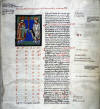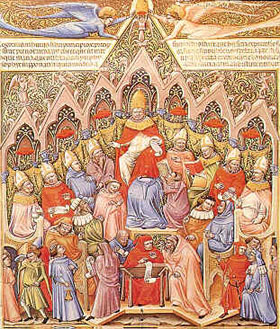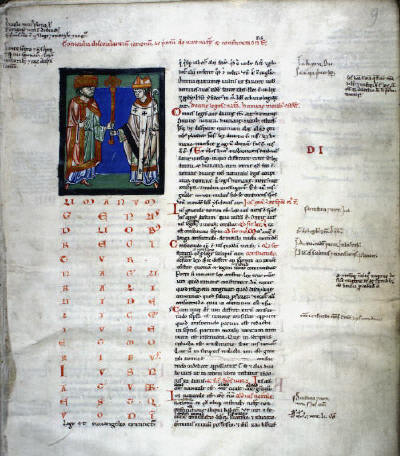Dictum before chapter 1, Distinctio 1 (D.1 d.a.c.1):
The Human Race is ruled by two things: namely, natural law and long standing custom (mos). Natural law is what is contained in the law and the Gospel. By it, each person is commanded to do to others what he wants done to himself and is prohibited from inflicting on others what he does not want done to himself.
Reading: Pennington, Lex naturalis and Ius naturale
Link to the Manuscripts in the Cologne Cathedral Chapter Library
Cologne, Dombibl. 127, fol. 9r
Cologne, Dombibl. 127, fol. 9v

Roman Law Source of Gratian's First Dictum
D.1 c.1 Fas et ius
Ratione lex constat (Law is confirmed through reason)
D.1 c.7: Ius naturale: Omnium una libertas
Roman law jurists use canon law
D.4 dictum after c.3:
<Gratianus>. Leges instituuntur, cum promulgantur, firmantur, cum moribus utentium approbantur. Sicut enim moribus utentium in contrarium nonnullae leges hodie abrogatae sunt, ita moribus utentium ipsae leges confirmantur. (Laws are instituted when they are promulgated; they are confirmed when they have been approved by the long standing custom of those who observe them. Some laws have have been abrogated by the long standing custom of those who have acted contrary to them, because laws are confirmed by the long standing custom of those who observe them).
The Canonists reflect upon Ius:
Gratian's Hierarchy of Laws and the Role of Consent
Laurentius Hispanus, Pope Innocent III: Quanto personam and Pro ratione voluntas
D.12 c.6: Laws abrogate or derogate custom; The Editing of Gratian

D. 19 and D.20: The Authority of Papal Decretals
